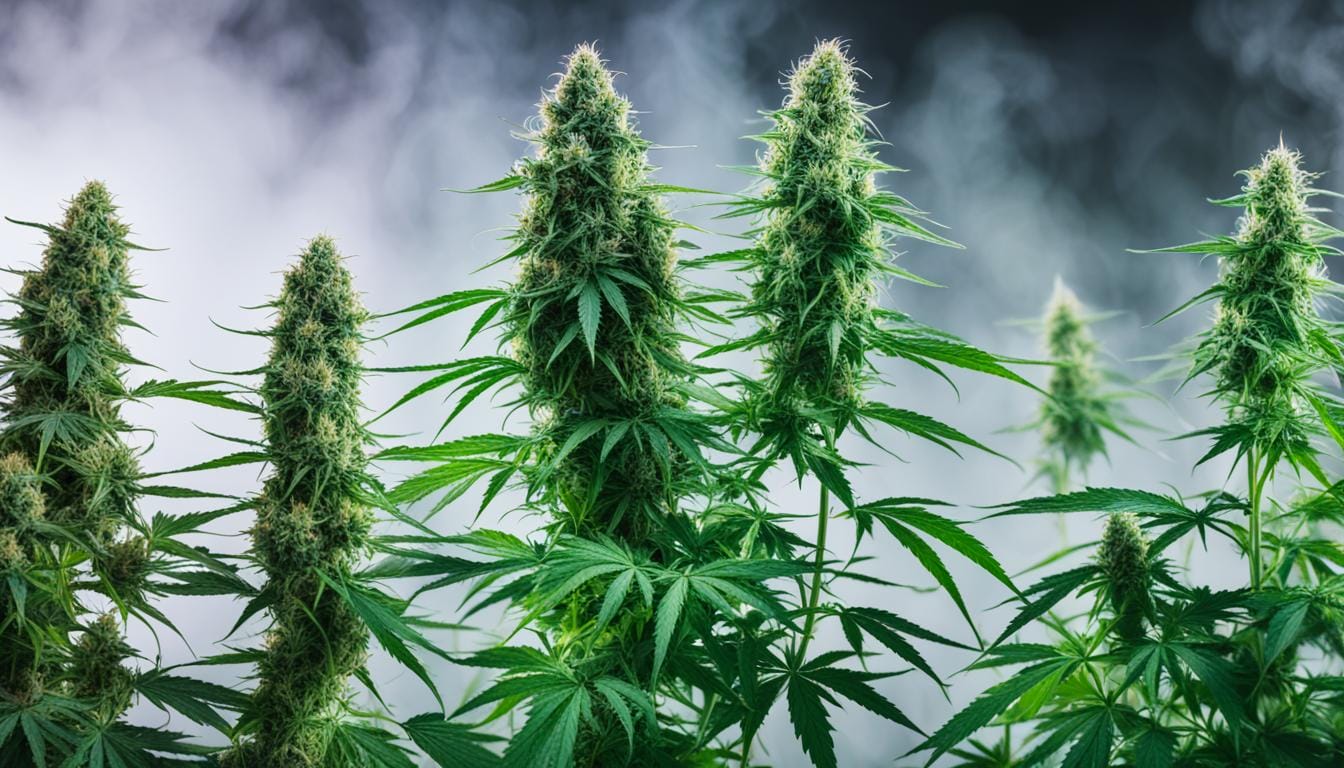Introduction to AI in Agriculture The integration of Artificial Intelligence (AI) into agriculture is no longer a futuristic concept but a transformative reality. In the realm of agriculture, AI’s potential to optimize processes, maximize yields, and sustain environmental resources is unparalleled. This is especially pertinent in specialized sectors such as cannabis cultivation, where precision and […]
CBG for Cancer: Unveiling its Potential Benefits & Research

In recent years, there has been growing interest in the potential benefits of CBG for cancer patients. Cannabigerol (CBG) is a non-psychoactive cannabinoid found in the cannabis plant that has shown promising anti-cancer properties.
While research on CBG and cancer is still in its early stages, several studies have explored its efficacy in managing various types of cancer, including lung, breast, colon, and pancreatic cancer.
In this comprehensive guide, we will delve into the potential benefits of CBG for cancer patients, its mechanisms of action, current research and studies, dosage considerations, potential side effects, and its integration into cancer treatment plans.
Key Takeaways
- CBG is a non-psychoactive cannabinoid found in the cannabis plant that has shown promising anti-cancer properties
- Research on CBG and cancer is still in its early stages
- Studies have explored CBG’s potential benefits in managing various types of cancer, including lung, breast, colon, and pancreatic cancer
- CBG oil may provide therapeutic benefits for cancer patients
- It is important to consult with healthcare professionals before incorporating CBG into cancer treatment plans
Understanding CBG and Its Role in Cancer Treatment
CBG is a non-psychoactive cannabinoid found in the cannabis plant. It has gained significant attention in recent years for its potential benefits in cancer treatment.
Research suggests that CBG may potentially have anti-cancer properties by inhibiting tumor growth and promoting cancer cell death. It may also have anti-inflammatory effects that could benefit cancer patients.
CBG interacts with the endocannabinoid system in the body, which plays a critical role in regulating various physiological processes such as pain, appetite, and immune response. By binding to specific receptors in the system, CBG may modulate these processes, potentially reducing cancer-related symptoms and promoting overall well-being.
CBG’s Effects on Cancer Patients
CBG has been shown to interact with different pathways involved in cancer development and progression. One of these pathways is the CB1 receptor pathway, which is involved in the regulation of cancer cell proliferation and death.
Another pathway that CBG may influence is the TRPM8 channel, which is overexpressed in prostate cancer cells. By binding to this channel, CBG may inhibit cancer cell growth and proliferation.
In addition, CBG may also have anti-inflammatory effects, which could be beneficial for cancer patients who often experience inflammation-related symptoms such as pain and swelling.
Undoubtedly, the potential benefits of CBG in cancer treatment warrant further research and investigation. It is important for cancer patients to consult with their healthcare professionals before considering CBG as a complementary or alternative treatment option.
CBG Oil and Its Potential in Cancer Therapy
CBG oil has garnered attention for its potential use in cancer therapy. While research is still ongoing, preliminary studies suggest that CBG oil may offer potential benefits for cancer patients as a complementary or alternative treatment option.
CBG oil is derived from the cannabis plant and contains low levels of tetrahydrocannabinol (THC), the psychoactive component of cannabis. Unlike THC, CBG does not produce a “high” and has a favorable safety profile.
CBG oil is available in various forms, including tinctures, capsules, and topical creams. Dosage considerations may vary depending on the form of CBG oil and the type of cancer being treated. It is crucial for individuals to consult with healthcare professionals before incorporating CBG oil into their cancer treatment plans.
There is limited research on the specific anti-cancer properties of CBG oil. However, it is believed to interact with the body’s endocannabinoid system, which plays a role in regulating various physiological processes, including immune function and inflammation.
Preliminary studies suggest that CBG may have anti-inflammatory and anti-tumor effects. For example, studies have found that CBG may inhibit the growth of colon cancer cells in vitro and in animal models. Additionally, CBG has shown promise in reducing inflammation in animal models of inflammatory bowel disease.
CBG oil may also offer potential benefits for cancer patients in terms of managing symptoms associated with cancer treatment. For example, CBG has been shown to have analgesic (pain-reducing) and anxiolytic (anxiety-reducing) effects in animal models.
It is important to note that CBG oil should not be used as a substitute for conventional cancer treatments, such as chemotherapy or radiation therapy. However, it may serve as a complementary therapy, potentially improving the overall well-being of cancer patients.
CGB for Lung Cancer
Some emerging studies suggest that CBG may have potential therapeutic benefits in the treatment of lung cancer.
Research has indicated that CBG may have anti-tumor effects, making it a promising option for lung cancer patients. CBG may inhibit the growth of cancerous cells and promote apoptosis, a process where damaged cells are destroyed before they can multiply and spread throughout the body.
In addition to its potential anti-cancer properties, CBG may also have anti-inflammatory effects. This is particularly relevant for lung cancer patients, as inflammation can exacerbate symptoms and contribute to disease progression.
It is important to note that while CBG shows promise in the treatment of lung cancer, more research is needed to determine its efficacy and safety. Patients considering CBG as a complementary or alternative treatment should consult with their healthcare provider and closely monitor their symptoms.
CBG for Breast Cancer
Breast cancer is one of the most common cancers among women, and many current treatment options can cause unwanted side effects. CBG, however, shows promise in managing breast cancer with fewer side effects.
Studies show that CBG may inhibit the growth and spread of breast cancer cells. Researchers believe that CBG may achieve this by interacting with the body’s endocannabinoid system, which plays a vital role in regulating cell growth and death.
In one study, researchers found that CBG inhibited the growth of estrogen receptor-positive breast cancer cells in mice. This is significant because many breast cancers are estrogen receptor-positive, which means that they need estrogen to grow.
Another study found that CBG was effective in reducing inflammation associated with breast cancer. Inflammation can contribute to tumor growth and spread, so reducing inflammation is a crucial part of managing breast cancer.
Overall, CBG shows promise in managing breast cancer, but more studies are needed to fully understand its potential benefits and risks.
CBG for Colon Cancer
Colon cancer, also known as colorectal cancer, affects many individuals worldwide. Research has shown that CBG, a non-psychoactive cannabinoid found in cannabis, may offer potential benefits for those with colon cancer.
CBG has been found to have anti-inflammatory and anti-tumor properties, which may be particularly helpful for colon cancer patients. Inflammation is a significant factor in the development and progression of colon cancer, and CBG has been shown to reduce inflammation in the body.
Additionally, CBG may inhibit the growth of cancerous cells in the colon. Studies have demonstrated that CBG can reduce the growth of cancer cells and induce cell death in colon cancer.
While further research is needed to fully understand the potential benefits of CBG for colon cancer, it shows promise as a complementary or alternative treatment option for patients. It is essential to consult healthcare professionals before incorporating CBG into cancer treatment plans.
CBG for Pancreatic Cancer
Pancreatic cancer is one of the most challenging forms of cancer to treat, with a low survival rate. However, research on the potential benefits of CBG for pancreatic cancer has shown promising results.
One study found that CBG inhibited the growth of pancreatic cancer cells and induced apoptosis, or programmed cell death. Additionally, CBG has shown anti-inflammatory and pain-relieving properties, which could be particularly beneficial for pancreatic cancer patients experiencing pain and discomfort.
Another study found that CBG may enhance the effectiveness of chemotherapy drugs commonly used to treat pancreatic cancer, potentially improving treatment outcomes.
More research is needed, but these initial findings suggest that CBG may offer valuable benefits for pancreatic cancer patients. As always, it is essential to consult with healthcare professionals before incorporating CBG into any cancer treatment plan.
CBG for Prostate Cancer
Prostate cancer is one of the most common cancers among men, and there is growing interest in the potential of CBG to manage this disease. Again, research is still in the early stages; however current studies suggest that CBG may offer potential benefits for prostate cancer patients.
In one study, CBG was found to inhibit the growth of prostate cancer cells in vitro. Another study found that CBG may help prevent the spread of cancer to other parts of the body.
As with other types of cancer, managing the symptoms associated with prostate cancer treatment is also an important consideration. CBG may help alleviate pain and inflammation, improve appetite and sleep, and reduce anxiety and depression.
However, it is important for patients to consult with their healthcare professionals before considering CBG as a complementary or alternative treatment option. Dosage considerations and potential interactions with other medications must also be taken into account.
Despite the promising research, further studies are needed to fully understand the potential of CBG for prostate cancer.
Current Research and Studies on CBG for Cancer
Scientific research on the potential benefits of CBG for cancer treatment is currently in its early stages. However, there have been several promising studies that provide insight into the potential therapeutic effects of CBG on various types of cancer.
CBG has anti-inflammatory and anti-tumor properties. It may also inhibit cancer cell growth and act as a potential cancer treatment.
A study published in the journal Molecular Cancer Therapeutics found that CBG may help inhibit the growth of colorectal cancer cells in animal models. Another study published in the journal Cancer Research found that CBG may have potential therapeutic effects on breast cancer cells by inhibiting their growth and slowing down their progression.
These studies suggest that CBG may have potential as a complementary or alternative treatment option for cancer patients. Further studies are needed to explore the full potential of CBG in cancer treatment and its underlying mechanisms of action.
Potential Side Effects and Considerations of CBG for Cancer Patients
As with any treatment, it is essential for cancer patients to consider the potential side effects and interactions of CBG. While CBG is generally considered safe, it may interact with other medications and cause side effects in some individuals.
Some potential side effects of CBG include:
- Dry mouth
- Dizziness
- Drowsiness
- Changes in appetite
- Low blood pressure
- Diarrhea
If you are considering CBG as a complementary or alternative treatment option, it is essential to consult with your healthcare professional first. They can provide guidance on potential interactions, dosage considerations, and the safety of using CBG alongside other cancer treatments.
Cancer patients should also be aware of the current legal status of CBG and its derivatives in their state. While CBG is legal on a federal level, some states have specific laws and regulations regarding its use.
While CBG shows promise in terms of its anti-cancer properties and potential to alleviate symptoms associated with cancer treatment, it is vital for cancer patients to approach CBG with caution. By working with healthcare professionals and being aware of potential interactions and side effects, CBG may be able to complement existing cancer treatments and improve overall well-being.
Integrating CBG Into Cancer Treatment Plans
If you are considering incorporating CBG into your cancer treatment plan, it is crucial to consult with your healthcare professional beforehand. While CBG shows promise in terms of its anti-cancer properties and potential to alleviate symptoms associated with cancer treatment, there are still potential risks and side effects to consider.
When discussing CBG with your healthcare professional, it is important to provide as much information as possible about your cancer diagnosis and treatment history. This will help them determine the best dosage and form of CBG for your specific needs.
It is also essential to let your healthcare professional know about any other medications or supplements you are currently taking, as CBG may interact with certain drugs and result in adverse effects.
Once you have received the green light from your healthcare professional, there are a variety of ways to incorporate CBG into your cancer treatment plan. For example, CBG oil can be taken orally, or applied topically to alleviate pain and inflammation. Additionally, CBG can be consumed as capsules or edibles, providing an easy way to introduce it into your daily routine.
It is important to note that CBG should not be used as a replacement for conventional cancer treatments such as chemotherapy or radiation therapy. Instead, it can be used as a complementary treatment to help alleviate symptoms associated with cancer treatment and improve the overall well-being of cancer patients.
Overall, integrating CBG into cancer treatment plans requires careful consideration and consultation with healthcare professionals. When used properly, CBG shows promise as a therapeutic option for cancer patients, and can help improve their quality of life during treatment.
CBG for Cancer: Conclusion
Cannabigerol (CBG) shows potential in helping cancer patients manage their symptoms and potentially combat cancer itself. While research is still ongoing, early studies indicate that CBG may have anti-cancer properties and be useful in treating various types of cancer.
Consulting With Healthcare Professionals
As with any alternative or complementary treatment option, it is crucial for individuals to consult with healthcare professionals before incorporating CBG into their cancer treatment plans. This will help ensure safety and avoid any potential interactions with other medications.
Potential Benefits for Cancer Patients
CBG may provide relief for a range of symptoms associated with cancer and its treatment, such as pain, nausea, and inflammation. Additionally, CBG may have anti-cancer properties that could potentially inhibit tumor growth or even shrink tumors.
Integrating CBG into Cancer Treatment Plans
Healthcare professionals may consider incorporating CBG into cancer treatment plans as a complementary or alternative treatment option. However, patients should always consult with their healthcare team before making any changes to their treatment plan.
Despite the promising potential of CBG for cancer patients, individuals must proceed with caution and consult with their healthcare professionals. With further research and exploration, CBG may become a valuable addition to cancer treatments in the future.
Now that you understand the role of CBG for cancer, check out the collection of regular, feminized, and autoflower cannabis seeds at Seeds Here Now.
FAQ
Q: What is CBG (cannabigerol)?
A: CBG is one of the many cannabinoids found in cannabis plants. It is non-psychoactive and has shown potential in various medical applications, including cancer treatment.
Q: What are the potential benefits of CBG in cancer treatment?
A: Current research suggests that CBG may have anti-cancer properties and could potentially inhibit tumor growth, reduce inflammation, and alleviate symptoms associated with cancer treatment.
Q: How does CBG interact with the body’s endocannabinoid system?
A: CBG interacts with the endocannabinoid system, which plays a crucial role in regulating various physiological functions. It may modulate the activity of cannabinoid receptors, leading to potential therapeutic effects.
Q: What forms of CBG oil are available for cancer patients?
A: CBG oil is available in various forms, including tinctures, capsules, and topical applications. It is important to consult with healthcare professionals to determine the most suitable form and dosage for individual needs.
Q: Does CBG have any potential side effects?
A: While CBG is generally well-tolerated, some individuals may experience minor side effects such as dry mouth, drowsiness, or changes in appetite. It is important to consult with healthcare professionals and consider potential interactions with other medications.
Q: Can CBG be used as a standalone treatment for cancer?
A: CBG should not be used as a standalone treatment for cancer. It is crucial to consult with healthcare professionals and integrate CBG into a comprehensive cancer treatment plan that includes appropriate medical guidance and other therapies.
Back






